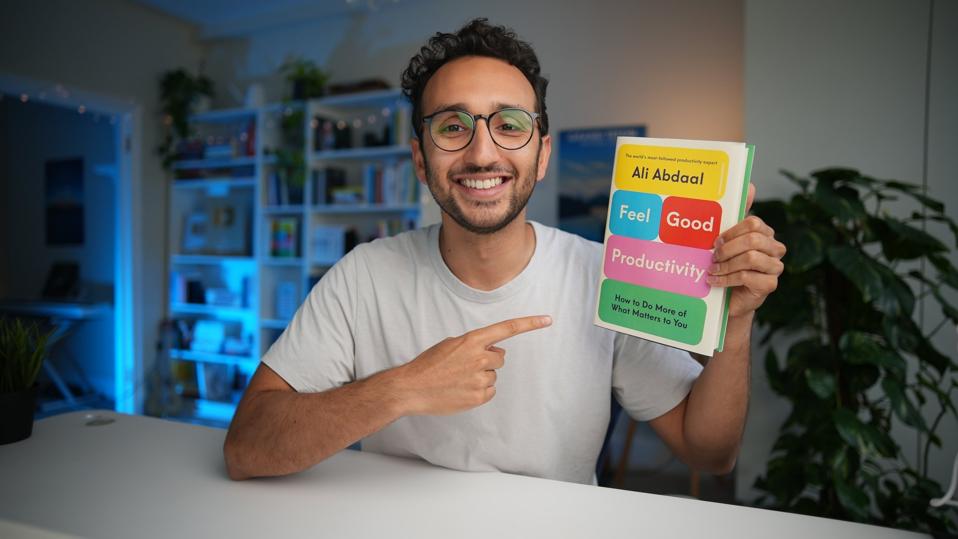When I picked up Feel Good Productivity, I wrestled with the idea of whether it was a book for the super productive or a guide to defeat procrastination. Maybe it lands somewhere in the middle. What I can tell you is that it’s easier to get things done when it’s fun — which is the thesis of this book by doctor turned YouTuber and productivity expert, Ali Abdaal.
Whether Ali was helping medical students study for their exams or sharing what he’s learned from books, he’s always been a teacher at heart. His superpower is his ability to distill information in a fun and engaging way. Personally, reading Atomic Habits by James Clear was like wading through mud. After procrastinating on reading the book I downloaded the Audible to reduce the friction.
“There has to be a reason this book has amassed nearly 122,000 Amazon reviews!” I kept telling myself there was a pot of gold on the other side of the rainbow.
Then I watched Ali’s video where he distilled Atomic Habits — and I was hooked. Why couldn’t learning always be this fun?
“The videos are treated as notes to myself. Making the video helps the content stick in my brain, so in a way it’s a selfish act but I’m glad others find it helpful as well,” Ali explained during our interview.
The love for learning was nurtured at an early age. His grandmother was a school teacher who helped tutor him and his siblings.
“The book wouldn’t have been possible without my mom and my grandma, secondly. My mom was a doctor and often at work, so my grandma would help us with our English and math. She is the one who made learning fun and interesting.”
In the midst of the pandemic, Ali was at an inflection point. He was planning on practicing medicine in Australia after a short break when they closed their borders. At that point, he’d already made more money he’d ever seen in his life through selling an online course (earning $27K/week). Half jokingly, he said that one year was equivalent to 20 years worth of salary as a doctor in the UK.
He credits a podcast interview with Lewis Howes on helping him make the full-time leap to focus on his business and to relinquish his identity as a doctor.
“What would it look like in the next 30 days if you completely stopped being of service as a doctor?” Lewis asked.
Over the next 65 minutes Ali ultimately realized that he could make a significant impact on others doing what he loves around productivity — rather than just making an impact by being a doctor. One wasn’t necessarily better than the other, they were just different paths. The interview felt like a two-hour therapy session I would recommend to anyone grappling with a career pivot.
Ali proceeded to pour three years of work to search for the answers to help people achieve more of what matters to them — all while making it more enjoyable. The book is chalk-full of practical exercises.
“It’s divided into three parts, each which tackle a different aspect of feel good productivity. Part one explains how to use the science of it to energize yourself. The next section examines how we can overcome procrastination. And then we explore how we can sustain feel good productivity for the long haul.”
In the book Ali says that in the words of psychology professor Joseph Ferrari, “To tell the chronic procrastinator to just do it would be like saying to a clinically depressed person, cheer up.”
He wants you to think of yourself as a productivity scientist. Test out the frameworks, prompts, and exercises to see what works for you. Use the ones that resonate and table the others.
Like Ferrari’s quote, he argues that the “discipline equals freedom” mantra isn’t sustainable. When we feel good about our work, we become more productive, more creative, and less stressed. Feel Good Productivity is the ultimate guide to help you overcome burnout and procrastination, practically.
One of the experiments in the book adopted by former NBA coach, Phil Jackson, stems from Zen Buddhism. Ali explained that one of the concepts that was often weaved into Jackson’s coaching practice was the Japanese word shoshin — which roughly translates to the ‘beginner’s mind.’
He explains that shoshin refers to a state of mind in which we approach every task and situation with the curiosity, openness and humility of a beginner. If you think you’re an expert in a field, you may naturally become close minded to new insights. A beginner, on the other hand, has none of these preconceptions.
Ali shares how we can think about the concept in our own lives and how letting go of the idea that we know everything can actually help us approach learning with a greater sense of curiosity.
One of my favorite experiments is the ‘wheel of life’ prompt where the wheel represents nine areas of life representing health, work, and relationships. The visual makes it a sticky exercise for me. Being that my health is a significant focus for me this year, I can make sure I’m mirroring my calendar and habits to align with my goals and aspirations.
More than anything Feel Good Productivity has been a guide that’s given me more clarity and self-awareness. Big annual goals often feel like a weight on my shoulders. In one of his podcast interviews, Ali was sharing an analogy of the architect versus the archeologist. For the architect to get started, everything has to be perfect — like the person who says they’ll start their fitness routine on Monday. The archeologist, rather, goes to dig and then moves to the next site. Like the gym, I know my goals aren’t zero-sum, but if I can think like the archaeologist I hope to enjoy the journey a bit more along the way.
—-

